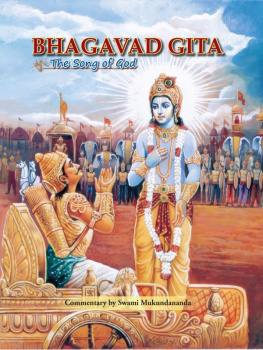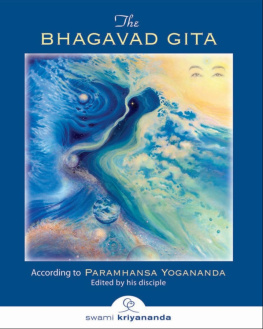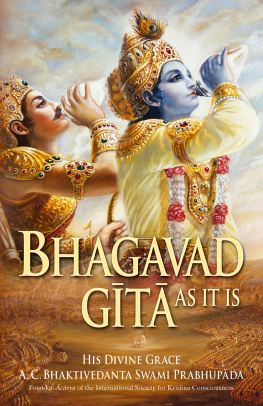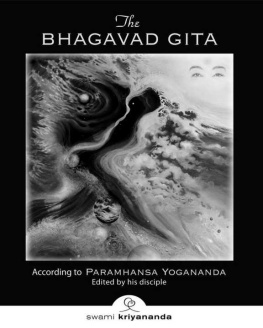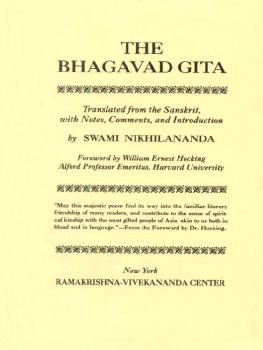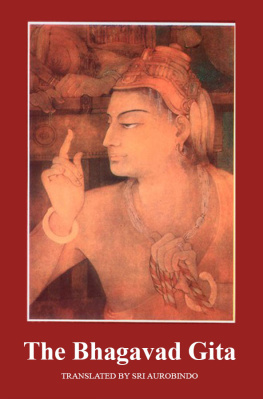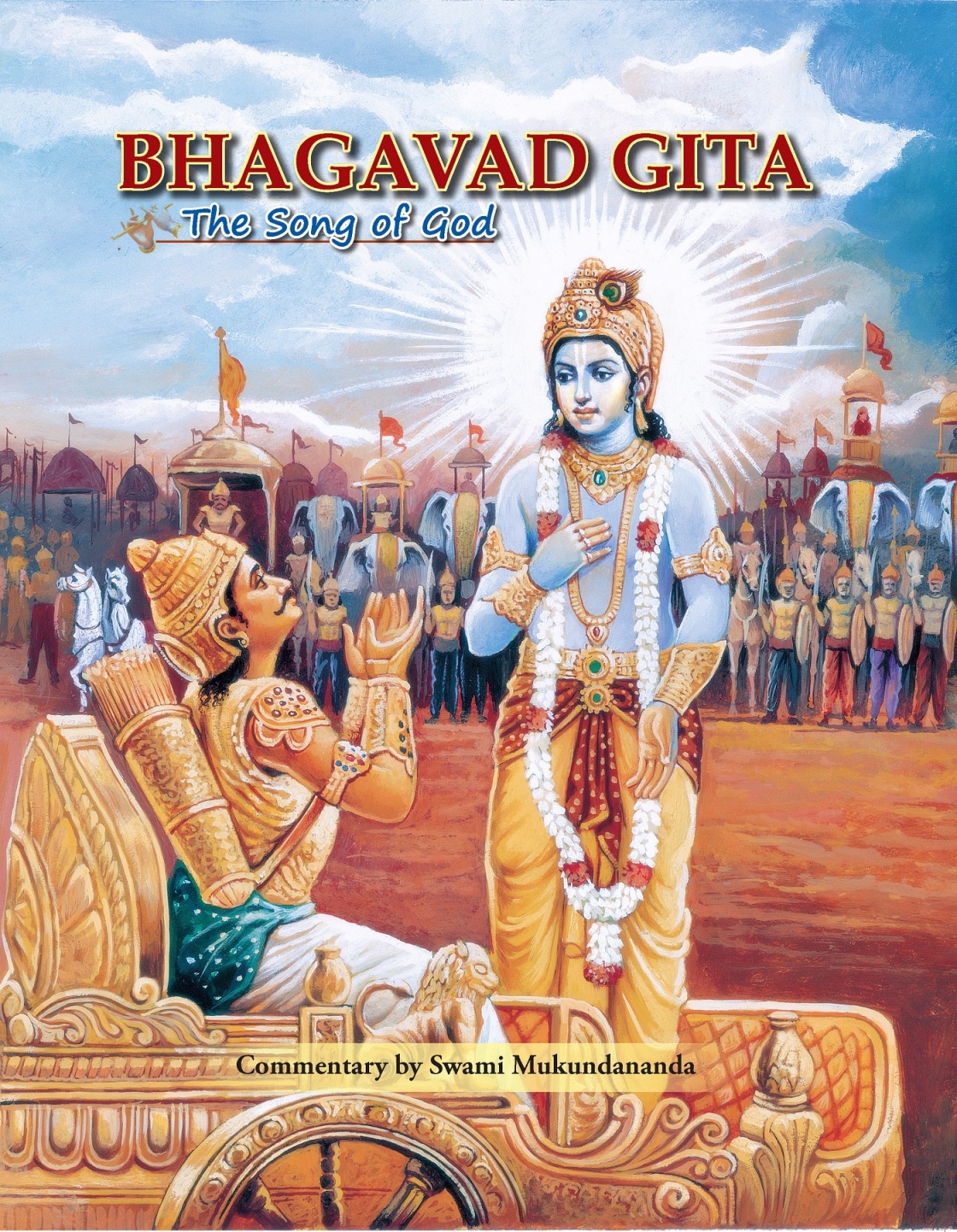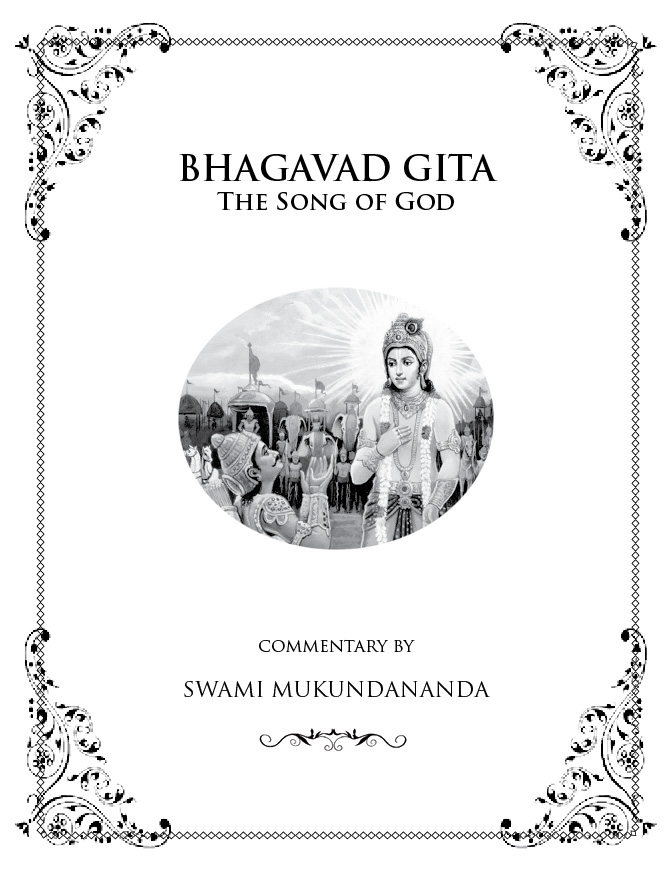Dedication
This elucidation of the Bhagavad Gita is dedicated to my Beloved Spiritual Master, Jagadguru Shree Kripaluji Maharaj, who is illuminating humankind with the purest rays of divine knowledge. He is immersed in the divine love bliss of God and is lovingly engaged in inundating the entire planet with it. This commentary on the Bhagavad Gita has been written to fulfil his instruction to me to preach the knowledge of the Vedic scriptures in the Western world. I pray that by his blessings it will be helpful in guiding sincere seekers of the Truth on the path of enlightenment.
Swami Mukundananda
Introduction
Invocation
prathama sadguru vande hr kiha tadanantaram
guru pptman trt hr kihastvamaltmanm
mukundnanda prapannoha guru pdravindayo
tasya preraay tasya divydeha vadmyaham
I first offer my respectful obeisance to my Gurudev, Jagadguru Shree Kripaluji Maharaj, and then to the Supreme Lord Shree Krishna. While Shree Krishna embraces the pure-hearted, my Gurudev is so merciful that he offers shelter even to the spiritually destitute. This insignificant inconsequential soul, who goes by the name of Mukundananda in the world, is surrendering at the lotus feet of his Spiritual Master. With his Gurus permission, inspiration, and grace, he is humbly going to elucidate on spiritual topics.
vande vindvannand rdhik paramehvarm
gopik param hddh hldin hakti rpim
I offer my respectful obeisance to Radharani, the Supreme Goddess and the bliss-giving power of God. She is the purest of the gops and embodies the bliss of Vrindavan.
kad drakhymi nandasya blaka npamlakam
plaka sarva sattvn lasattilaka bhlakam
When will my eyes see the wonderful form of the Supreme Lord Shree Krishna, who appeared on this earth as the son of Nand? He is adorned with a flower garland around his neck and the holy tilak mark on his forehead; he is the protector of virtuous people.
ajta pakh iva mtara khag satanya yath vatsatar khudhrt
priya priyeva vyuhita viha manoravindkha didikhate tvm
O Lord! As a baby bird yearns for its mother, as a famished infant longs to suckle the mothers breast, and as a lover craves for the beloved, may my mind always long for your divine vision.
The Ascending and Descending Processes of Knowledge
There are two ways of acquiring knowledge. The first is the ascending process, in which we utilize our senses, mind, and intellect to explore, discover, and conclude about the nature of the truth. The second is the descending process, where we simply receive the knowledge from a proper source. The ascending process of gaining knowledge is inherently prone to defects. Since our senses, mind, and intellect are made from the material energy, they are imperfect and limited. As a result, we can never be completely sure about the accuracy and reliability of the knowledge we gain through them.
As the pursuit of material science is based upon the ascending process, even the most acclaimed and undisputed scientific theories of the past are overthrown and superseded by newer ones. For example, the Greek concept of matter as consisting of indivisible atoms was invalidated by Rutherford when he demonstrated that atoms consist of electrons, protons, neutrons, and vast regions of empty space. Rutherfords theory was overthrown by the Quantum theory, which stated that electrons and protons are not solid particles, but vibrating patterns of energy with a dual particle wave nature. This makes us wonder whether what we believe to be true today will also be proven utterly incorrect after a few centuries.
The other process of knowledge, the descending process, on the other hand, is completely devoid of such defects. When we receive knowledge from a perfect source, we can be assured that it is flawless. For example, if we wish to know who our father is, we do not conduct experiments. We simply ask our mother, as she is the authority on this piece of information. Likewise in spiritual matters too, the descending process immediately gives us access to vast reservoirs of knowledge, which would have taken ages of self-effort to unveil. The only criterion here is that the source from which we receive the knowledge must be infallible and trustworthy. The Vedas are one such source of knowledge.
The Vedas are not the name of any book. They refer to the eternal knowledge of God, which he manifests when he creates the world. In this cycle of creation, he first revealed them in the heart of the first-born Brahma. These Vedas were passed on for thousands of years by oral tradition, from master to disciple, and hence another name for them is hruti (knowledge received by hearing). They are also called apauruheya (not created by any human). For this reason, in Indian philosophy the Vedas are considered the ultimate authority for validating any spiritual principle. The validity of any spiritual tenet, whether in the context of the past, present, or future, must be established on the basis of the Vedas. To elaborate their meaning, many more scriptures have been written. These scriptures do not deviate from the authority of the Vedas. Rather, they attempt to expand and explain the knowledge contained in them. Together, all these are termed Vedic scriptures.
The Vedic scriptures are vast, but three of them have traditionally been called the Prasthn Tray (three points of commencement for understanding Vedic thought). These are the Upanihads , the Brahma Stras, and the Bhagavad Gita.
The Upanihads are the section of the Vedas that deal with philosophical knowledge, and are considered the cream of the Vedas. On reading them, the German philosopher, Arthur Schopenhauer (1788-1860) said, There is no philosophy in the world as elevating as that of the Upanihads . It has been the solace of my life and it shall be the solace of my death. Paul Deussen (1845-1919), another German philosopher, expressed himself thus: Eternal philosophical truth has seldom found a more striking and decisive expression than in the emancipating knowledge of the philosophy of the Upanihads . However, for a lay person the Upanihads are difficult to fathom.
The Brahma Sutras is a synopsis of the Upanihads . It was written by Ved Vyas to provide the philosophical conclusion of Vedic knowledge. Thus, it is also called Vedant, meaning the culmination of Vedic thought. Like the Upanihads , the Brahma Sutras is also hard to comprehend and its conciseness often leads to ambiguity and subjective interpretation.
The Bhagavad Gita is more accessible than the above two scriptures. It provides a comprehensive and easy-to-understand summary of the Vedic philosophy. Bhagavad means of God and Gita means song. Hence, the Bhagavad Gita literally means Song of God. It is a dialogue that took place between the Supreme Lord Shree Krishna and his devotee Arjun, on the verge of the Mahabharat war.
In the course of history, hundreds of theories in economics, psychology, sociology, philosophy, etc. were first propounded and then discarded as inaccurate or incomplete. These were all the products of ascending knowledge, and hence imperfect and subject to error. If the Bhagavad Gita were also the creation of a mortal and finite intellect, with the passage of fifty centuries, it would have become outdated and irrelevant. However, the perennial wisdom of the Gita has continued to inspire famous thinkers even in modern times, such as Mahatma Gandhi, Robert Oppenheimer, Carl Jung, Herman Hesse, and Aldous Huxley, to name just a few, thus indicating its divine origin.


